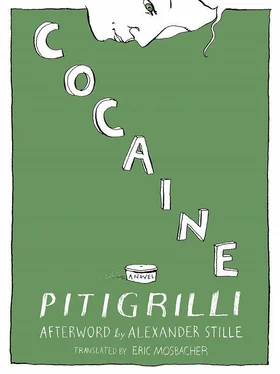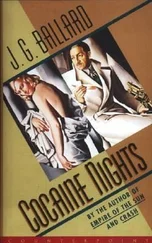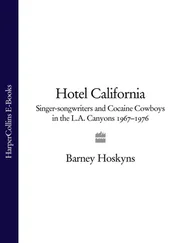“Child,” said Kalantan.
And instead of using the usual words that women use to console us, instead of opening the first aid box of common sense and applying to his brow the cold compress of verbal tenderness, instead of showing him he was wrong, she comforted him with the sweetest tonic, the only one that really raises our spirits and destroys the gloomy products of the imagination.
“Child,” was the only word she used.
And while she whispered it through clenched teeth she took him by the cheeks, fell backward on to the cushions and, bringing his face to her white bosom, sealed his mouth with one of her breasts.
Tito’s Arnaudi’s article on the execution that did not take place was a sensational success. The newspaper was sold out in a few hours; newsagents in the provinces ordered more copies by telegram, and the special edition was twice reprinted. The other Paris dailies, which reported the presidential reprieve, were scooped, and The Fleeting Moment immediately acquired the reputation of being the best informed newspaper in France.
A fierce controversy arose between The Fleeting Moment and the TSF, which argued that the institution of the Republic must function in full daylight and protested vigorously against what it called the false news of the presidential reprieve communicated to the newspapers by the Ministry to prevent reporters from being sent to witness the event. It insisted, in other words, that executions must take place in full view of the citizenry and not be covered up by false news of reprieves. Other newspapers tried to excuse the demonstrable inadequacy of their news service saying that they had known about the execution, but out of a sense of humanity had refrained from reporting the terrible event.
The result was that two days later, when the Minister of Information and Keeper of the Seals informed the press that Marius Amphossy really had been reprieved, no one believed him, for the description of the execution in The Fleeting Moment had been so circumstantial, so rich in detail, that it could not possibly have been invented.
Even the executioner almost believed Tito’s story.
“You’re such a marvelous hoaxer,” the editor said to Tito, that I propose to take you off reporting and put you on home politics. Later I’ll put you on foreign politics. But in the meantime I want you to do me a favor.”
“Delighted.”
“Our Bordeaux correspondent has died, and I’d like you to go there for a few days until we find a replacement.”
“But I’ve never been to Bordeaux.”
“That doesn’t matter. All you have to do is look at the local newspapers every morning and telephone us the news you think might interest us.”
Next day Tito was in Bordeaux, furious at having had to leave his two mistresses in Paris. The first thing he did was to buy three or four newspapers, go to the telephone and have himself put through to The Fleeting Moment in Paris.
“A whole family poisoned by mushrooms,” he read on the third page, and, with his mouth to the receiver, his eyes on the newspaper and his mind on his two incomparable mistresses, Kalantan and Maud, he started dictating to the shorthand writer five hundred miles away, who dutifully and prosaically took down what he said. It was a horrifying account of how a modest bourgeois family, to celebrate the grandparents’ golden wedding, had sat down to a magnificent dish of fried mushrooms, which had unfortunately been collected by inexperienced persons. Suddenly they were all seized with terrible pains, and just when the grandparents, parents, grandchildren and a nurse maid were on the point of commending their souls to God…
But the story ended with a eulogy of certain products (the safety of which was guaranteed by experts) manufactured at a well-known Bordeaux factory. The poisoning story was just an advertising stunt.
Tito was struck dumb. He had telephoned an advertisement to his newspaper, having mistaken it for a news story.
“Well?” said the shorthand writer at the Paris end of the line. “Why have you stopped? What happened?”
Tito’s pride would not allow him to admit his mistake. “In spite of the doctor’s efforts there were no survivors,” he went on.
“How many dead were there, then?” asked the shorthand writer.
“Twenty-one,” Tito firmly announced.
That afternoon’s edition of The Fleeting Moment reported under a three-column headline a piece of news that no other newspaper could claim to have:
“GOLDEN WEDDING TRAGEDY AT BORDEAUX. POISONOUS MUSHROOMS KILL 21. OFFICIAL INQUIRIES IN PROGRESS. COLLECTIVE SUICIDE OR CRIME?”
Tito would have been happy enough in Bordeaux but for the haunting memory of those two women. Bordeaux, according to its inhabitants, has nothing to envy Paris for. The smart ladies even talk the Paris argot, the famous wines of Bordeaux are held in little esteem there, and no one uses the world-famous Bordeaux mustard; and the Atlantic provides a bracing smell of the infinite and delicious Arcachon oysters. But it did not provide Maud, or Kalantan, the Armenian widow of many vices and many oil wells.
Being a local correspondent at Bordeaux was tedious, not because of the excess of news, but because of its scarcity.
Nothing important ever happened, there were no scandals, no worthwhile crimes, no sudden deaths of famous men. The editor had sent him a telegram saying: “Your news insufficient. Send sensational news.”
“But if nothing sensational ever happens,” poor Tito said with his mouth to the receiver, desperately turning over the dreary pages of the local newspaper in the hope of finding something.
“The editor asked me to ask you on his behalf to send plenty of interesting news,” the shorthand writer said.
“Did he?” Tito said. “Then take this: When a big sausage manufacturer in southern France whose name we cannot yet disclose heard that two illegitimate children were born of the illicit love affair between his wife and a Vaudois shepherd, he killed the woman and her children, and to conceal the crime he minced them at night in the lonely factory and used them to fill hundreds of sausages that were distributed all over France, We shall be in a position to give more details tomorrow.”
Next day there was a catastrophic drop in the price of sausage meat all over France. No one bought sausages; retailers refused to accept them and cancelled orders and payments.
A Toulouse manufacturer who was incorrigibly honest and therefore not very successful could no longer sell anything, and with bankruptcy staring him in the face shot himself through the heart with a revolver.
The biggest shareholder in The Fleeting Moment , who was a big exporter of sausage meat, called a directors’ meeting and insisted on the editor being sacked. All the sausage eaters in France demanded to be told the trademark of the incriminated sausages. All the ruined pork butchers wanted to know the name of the killer who had put women’s and children’s flesh into sausages instead of donkey meat.
The editor of The Fleeting Moment recalled Tito to Paris, and he arrived by the next train.
“I’m ruined,” the editor lamented. “They want me to publish the manufacturer’s name.”
“Publish it, then,” said Tito.
“What name can I give?”
“There’s no need to make one up. A big sausage manufacturer has committed suicide at Toulouse. Let us say that it was he. His tragic end amounts to a confession. His name was Thomas Salmâtre.”
The editor was radiant; he glowed with his own light. That evening’s Fleeting Moment announced the honored name of the suicide Thomas Salmâtre in big headlines.
Читать дальше



